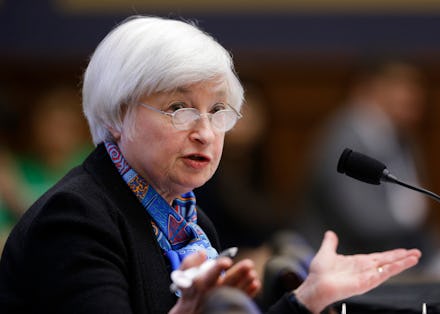The Fed Won't Raise Interest Rates Just Yet: Here's Why You Should Care

The Federal Reserve will keep target interest rates unchanged, according to minutes from the central bank's two-day July meeting released on Wednesday.
Employment figures in the United States are growing stronger, the central bank wrote, but measures of inflation "remain low." Overall, the statement suggested the U.S. economy is improving.
"Near-term risks to the economic outlook have diminished," the Federal Open Market Committee wrote in its notes.
Why, exactly, should you care? Let's break it down.
What the central bank does, exactly
Known colloquially as "the Fed," the U.S. central bank is tasked with stabilizing the economy by controlling inflation and employment. Its main lever is interest rates: By raising and lowering the cost for banks to borrow money — and in turn, how much banks charge consumers — the Fed influences everything from hiring to home purchases to consumer spending.
The Fed's top goal is to keep employment as high as possible while tamping down price inflation.
For instance, in the wake of the Great Recession, interest rates were lowered to virtually nothing in an attempt to stimulate the economy (by making it cheaper to borrow, the thinking goes, businesses are more likely to expand and hire).
On the flip side, the Fed will raise interest rates if it senses that prices are rising too fast for American consumers to keep up.
How this affects you
Interest rates have a big impact on your everyday finances.
To use the example of credit cards, when interest rates rise, you can expect to start paying a little more on your bill within a month. Mortgage rates, student loan rates and the cost of an auto loan are also affected by rate hikes.
There is an upside, however, since higher interest rates mean more earnings on your interest checking and savings accounts — though, unsurprisingly, banks drag their feet on passing rate bumps to consumers: A recent Federal Reserve Board study estimated it can take between five and nine months.
What's going to happen next?
One fear is that keeping interest rates too low for too long can cause irregularities in global markets: Some believe this has already happened, and that low interest rates have caused stock prices to get too high.
In December, the Fed raised interest rates slightly for the first time in about a decade, reflecting a cautiously more optimistic outlook for the economy.
Economists will pore over today's meeting minutes for clues as to whether we can expect a second interest rate hike when the Fed weighs the topic again later this year.
July 27, 2016, 2:34 p.m. Eastern: This story has been updated.
Read more: